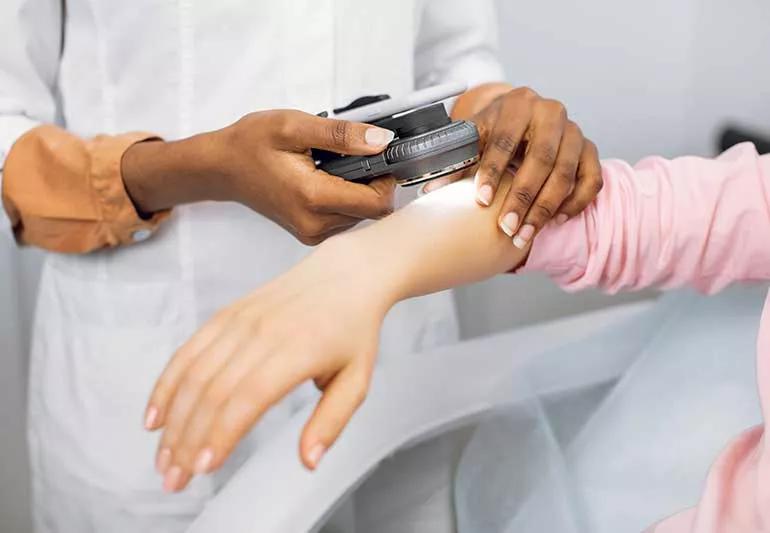In some cases, itchiness can be a symptom of skin cancer

Image content: This image is available to view online.
View image online (https://assets.clevelandclinic.org/transform/ebb87086-c202-4b40-a626-247d2042cbf3/Skin-Cancer-Itch-1321091284-770x533-1_jpg)
Dermatologist checking patient's arm.
As skin cancer affects the largest organ in your body, you might assume that itchiness is a surefire symptom. But that may not always be the case.
Advertisement
Cleveland Clinic is a non-profit academic medical center. Advertising on our site helps support our mission. We do not endorse non-Cleveland Clinic products or services. Policy
Overall, itchiness (medically known as pruritus) can develop as a symptom of skin cancer, but it will manifest differently depending on the type of cancer. Now, this doesn’t mean you should stress over every single itchy area. There are other signs you should look out for as well.
Plastic surgeon and otolaryngologist Brian Gastman, MD, explains itchiness as a symptom of skin cancer and how to identify it.
There are a lot of reasons why your skin might feel itchy — a pesky mosquito bite, eczema or dry, winter skin come to mind as just a few. But in certain cases, it can also be a sign of skin cancer.
Why does this happen?
“Many cancers occur due to chronic inflammation and that chronic inflammation brings in immune cells which release factors, which then cause irritation focused in a certain area,” explains Dr. Gastman. In fact, for this same reason, non-skin-related cancers may also lead to itchiness as a symptom.
Of course, it’s important to know that this is a classic example of how correlation is not the same as causation. In other words, skin cancers won’t always be itchy, but in a lot of cases, it can be one of the symptoms to look out for.
“All skin cancers can have an itchiness to them because there’s an inflammatory component,” notes Dr. Gastman. “I wouldn’t say it’s the most common symptom, but almost all skin cancers — from melanoma, squamous cell to basal cell — can have an irritated, itchy component to them.”
Advertisement
If you feel an itch, the next step would be to look at the area for any other visual symptoms like changes in texture, shape or color.
Here are some ways to identify different types of skin cancers:
Again, an itchy feeling alone isn’t a reason to assume skin cancer. But see a doctor if you also notice any changes in your skin like new spots or moles that are changing over time.
You should also see a healthcare provider and consider getting a full-body skin cancer screening if you’re also experiencing:
Keep in mind that these symptoms shouldn’t be observed in a vacuum — take in the whole picture. But at the end of the day, you’re the one seeing your skin every morning, noon and night, so go with your gut if you’re noticing anything out of sorts.
“It’s also important to have a look at your own personal history,” advises Dr. Gastman. Yes, itchiness can be a symptom of skin cancer, but there are other factors to take into account as well.
Some questions your healthcare provider may ask you to get a clearer picture include:
It’s also good to remember that certain cancer treatments can cause itchiness. For instance, chemotherapy is known to dry out your skin, which may lead to irritation or itchiness. So, it’s important for you and your healthcare provider to take that into account if necessary.
Advertisement
Finally, it’s likely that if you’re feeling an itch, you’ve scratched it at some point. This could be partially why the spot is changing in color or intensity.
“Sometimes, we don’t know if it’s the chicken or the egg,” illustrates Dr. Gastman. “Is it really the itching that is causing you to scratch, or is the act of scratching making it more irritated?”
This is why it’s best to avoid scratching the area and instead seek medical treatment if the itch is becoming too much to handle. Whether the itch is caused by skin cancer or not, there’s likely a specific way that it needs to be approached so it doesn’t get worse. Scratching or picking at the area can make it more irritated and harder to inspect how it changes over time. “If you’re gonna scratch an area that’s never gonna heal, that’s a problem,” stresses Dr. Gastman.
An itchy area is likely your body trying to tell you something. Whether it’s sounding off the alarm for skin cancer isn’t guaranteed. But if you’re living with a type of skin cancer, it’s good to know what symptoms may be expected and how to move forward.
Advertisement

Sign up for our Health Essentials emails for expert guidance on nutrition, fitness, sleep, skin care and more.
Learn more about our editorial process.
Advertisement
Anything from minor irritations and chronic diseases to, yes, cancer can cause persistent itching
Options range from allergic reactions and head lice to chronic conditions and fungal infections
Your body’s natural response to starting workouts may include an urge to scratch
Tips and tricks to soothe the itch
The size, shape and color of moles may offer clues that point to melanoma
From hyperactive immune response to disordered nerve connections, the itch is real
Family history matters for melanoma, but the connection isn’t as strong for other skin cancers
The simple, straightforward and hard-lined answer is no
Type 2 diabetes isn’t inevitable with these dietary changes
Applying a hot or cold compress can help with pain
Pump up your iron intake with foods like tuna, tofu and turkey